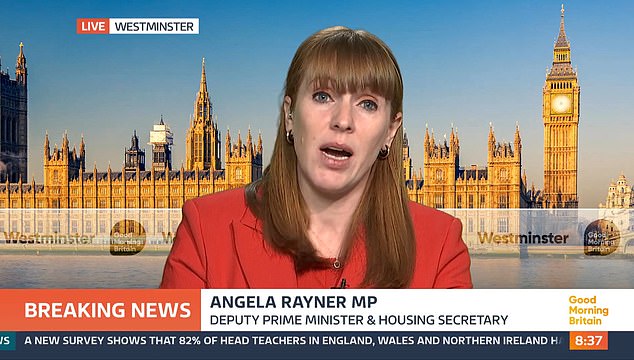Angela Rayner today insisted that her plan to implement ‘the biggest upgrade in workers rights in a generation’ will boost the economy, amid fears it will hammer businesses.
The Deputy Prime Minister insisted that the Employment Rights Bill would trigger a boom in spending because millions of people would have the security to ‘get on in life’.
Ms Rayner is facing business backlash to her bill over fears firms will be hit with major new costs at a time when the economy is staggering.
She is expected to table amendments to her won legislation today that water down some of the original provisions, including axing the ‘right to switch off’ that would allow workers to ignore emails, texts and call our of work hours.
It will also bring in a nine-month probation period for new workers, rather than the six months previously announced.
Ms Rayner told BBC Radio 4’s Today programme that ‘insecure work and low pay has left our economy in a really difficult position’.
‘When they have that (pay and security) they can spend that in their local economy and they can get on in life,’ she added.
‘At the moment far too many workers don’t know what pay they are going to be getting, have far too month left at the end of their paycheck.
‘They cannot get a mortgage, they cannot secure their hours and that is what we are going to change.

The Deputy Prime Minister insisted that the Employment Rights Bill would trigger a boom in spending because millions of people would have the security to ‘get on in life’.

The decision is said to have been taken by Business Secretary Jonathan Reynolds and Chancellor Rachel Reeves over concerns the provision would have been too much of a burden.
The proposal to grant workers a ‘right to switch off’ was originally included in Labour’s ‘new deal for working people’.
Similar proposals have been implemented in countries such as Belgium, Ireland, and France – which allow workers to avoid emails, texts and phone calls received out of hours without fear of reprisals.
Supporters say the right would help Brits avoid their homes becoming ’24/7 offices’, after the pandemic drove a surge in remote working.
The decision is said to have been taken by Business Secretary Jonathan Reynolds and Chancellor Rachel Reeves over concerns the provision would have been too much of a burden.
The rights overhaul was rebranded as ‘Labour’s plan to make work pay’ in May, with a blanket commitment to ending zero-hours contracts downgraded to ending ‘exploitative’ contracts.

Leave a Reply